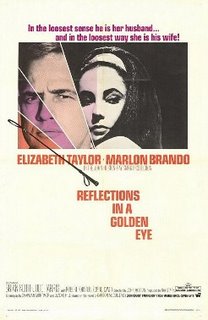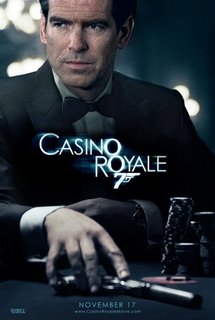Screening Diary: Week of 12 Nov 06
 Babel (2006, Alejandro González Iñarritu) [D+]
Babel (2006, Alejandro González Iñarritu) [D+]Too bad screenwriter-buddy Guillermo Arriaga’s jumping ship -- I was sincerely hoping that he and Iñarritu’s next film would take place all over the galaxy, sketching the connections between lowly earthlings and a variety of alien species, who of course brood up a storm. (“What makes us the same is what makes us miserable...from the sponge-gorillas of Centaur Delta 7 to the arachnid-frogs of Pegasus 9.4.”) The Crash allusions aren’t unearned, but they don’t explain what’s so aggravating about Babel. Haggis may never have had anything specific to say about his gallery of latent (or not) racists, but the message was still clear. (“No, I’m sorry, it was a trick question: the entire panel are racists!”) Babel’s just passive-aggressive, coyly refraining from making any grand judgments while making plenty of smaller, equally shallow ones. And so we get Iñarritu and Arriaga getting within an inch of saying, for instance, that it’s somewhat wrong that Brad Pitt and Cate Blanchett’s children got saved from the wilds of the desert while the maid got shipped back to Mexico for stupidly leaving them there, but not quite saying it because, y’know, that’s kind of stupid when you think about it. Not to mention, this is one of those movies where everyone does the single stupidest thing they could possibly do, especially if they’re Gael Garcia Bernal. There’s a meme that’s been sifting through the, uh, memesphere that posits that the real villain of the trilogy is Arriaga, and that it’s entirely possible that Iñarritu is more a tech man. That may be, but that still leaves me with little hope for the guy: his gritty hand-held shtick is virtually indistinguishable from anyone else who throws out their tripods, his Intolerance-esque four-way editing suite rarely produces thought-provoking or even visceral ricochets, and the one scene that comes closest to conjuring up a new sensation -- Rinko Kikuchi in the club, the sound going on and off -- is built around an effective but jujune idea whose novelty wears off as soon as you figure out what’s going on. (I.e., pretty much immediately.) That said, anything that reminds me (and hopefully others) how awesome Code Unknown and 71 Fragments of a Chronology of Chance are isn’t entirely wasteful. Crash, I’m looking your way.
 Reflections in a Golden Eye (1967, John Huston) [A-]
Reflections in a Golden Eye (1967, John Huston) [A-]Hard to imagine anyone ever watched this in standard color; maybe that explains why it's been left for dead. Its famed pictorial shtick -- in which the entire frame is bathed in a hazy golden (heh) hue, except for one strategically colorized object in the frame (like Elizabeth Taylor’s red shirt in a room full of men) -- may be just that (i.e., a shtick), but it’s unlike anything you’ve ever seen, and perfectly compliments this odd mood piece besides. (The film was released in this strange format, but was swapped for the traditional color version a week later after people complained it was too weird.) Certainly one of the most deterministically experimental studio pics ever green-lit, Huston’s film also made a benchmark for portrayal of homosexuality. It’s still caught in the gay=crazy vein, but it’s remarkably frank about what’s ailing Marlon Brando’s Army post Major, leaving little doubt as to why he keeps staring and stalking Robert Forster’s zombie-esque volunteer Private, who has a habit of riding around horseback in the buff. Though it won’t rank with Streetcar, Last Tango or even Burn!, Brando’s performance is uncommonly terrific and subtle; he plays his character as a man not so much torn as breaking down. When he screams “I’ll kill you” at Elizabeth Taylor, he puts his whole body into it, suggesting that every last inch of him is struggling to make sense of this new sensation. (Ditto his horse-beating scene.) Meanwhile, his big in-denial monologue plays like an android reading a script -- perfectly suitable for a character so excruciatingly in denial. Huston’s portrayal of violence, meanwhile, is sudden and brutal. Also, greatest final shot ever? No. But it’s close.
Children of Men (2006, Alfonso Cuarón) [A-]
I might be writing about this when it comes out, so let’s keep mum till that potential occasion. Or rather, mum except for this: the three bravura long takes you’ll be hearing cinephiles yammering endlessly about within the next two months aren’t the only reason this kicks the holy ass. V For Vendetta better watch its back.
The Fountain (2006, Darren Aronofsky) [C-]
Hard to hate, and I feel guilty pitying it. This film has been through the ringer, from conception to development to the reaction from everyone who isn’t a Premiere lacky. And some of its images are pretty striking, especially the shot of hanging lights in Isabel’s court (it’s in the trailer), or any of the times Hugh Jackman’s fingers do a roundelay with the tree’s hairs (that one’s not, and you’ll have to see it). But it never even gets off the ground, let alone moves the posts of sci-fi. The problem (or one of them) is that it’s clear lightning fast that this isn’t to be taken literally, and that everything but the middle period is a fiction or a metaphor. A love story spanning a thousand years? Hell, we never even see the Bald Jackman design the poster’s space bubble, let alone hop into it with a tree. I so want to like Aronofsky, as he’s one of the few young turks working with Eisensteinian montage. But he needs to start adapting other people’s work, or at least come to grips with the paucity of his ideas. I still think his Batman: Year One would’ve been pretty awesome, just as Requiem For a Dream is often awesome if you don’t think about it.
 Casino Royale (2006, Martin Campbell) [B]
Casino Royale (2006, Martin Campbell) [B]I’m still not sold the way others are on the lack of bloat, and it’s definitely too long. But over the past couple days, I’ve realized I kinda can’t wait to see it again. The action scenes, and not only the one with parkour, are genuinely exciting and clever, Judi Dench M proves she’s even more valuable to the series than previously thought, Eva Green makes for the most fascinating Bond Girl since Diana Rigg (though, I should admit I have a thing for Sophie Marceau’s baddie B.G. in TWINE) and, of course, Fuck these people in my opinion. Moreover, while hitting the reset button doesn’t rejigger the franchise quite as aggressively as it did with Batman Begins, it has the gauling second half that one chickened out on. The whole film, slowly and steadily, builds up to a single, extremely familiar statement of purpose, and when it comes, it’s impossible not to titter. Not to mention, this is the first Bond movie I can remember where Bond gets more skin time than the girls. And one of the girls is Eva Green! Think long and hard about that. Moment I realized I truly dug it: hotel clerk tells Daniel Craig to enjoy his stay. Craig pauses, dumbstruck, then genuinely and through a big, chipper smile replies, “Thank you. I will!”


0 Comments:
<< Home